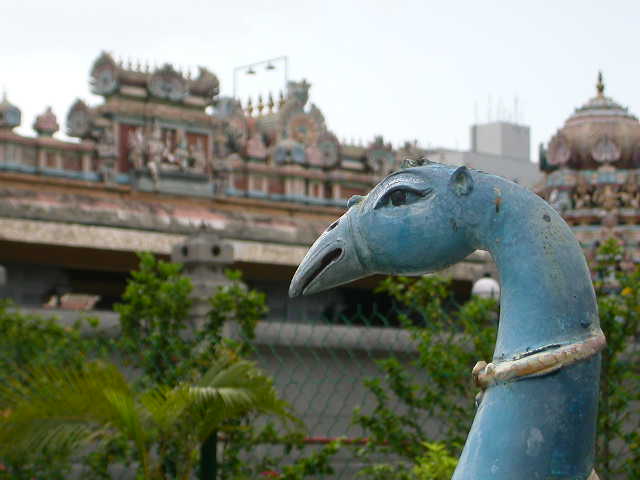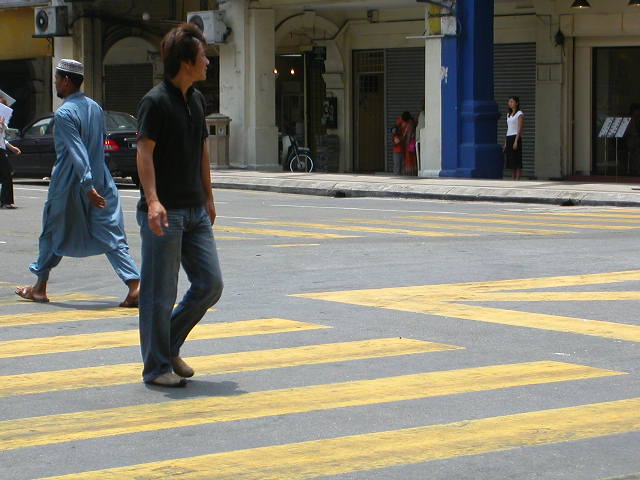» Crowded World Home
» Jews in Malaysia
» Jobs for Foreign Doctors in Malaysia
» Information for Indians Hoping to Work in KL
» Information Technology Jobs in Malaysia
» Jobs for Africans in Malaysia
» LoyarBurok: "I Have Freed My Spirit"
» Medical Jobs in Malaysia
» Study Dentistry in Malaysia

 Pictures of Little India Kuala Lumpur Malaysia
Maps

Interactive photographic map of the entire world!
|

RACISM IN SCHOLARSHIP ALLOCATIONS // july 14 2008
There is plenty of passionate debate on the subject of the JPA Scholarships on the Kim Kit Siang for Malaysia blog. The debate was prompted by this following letter, which reads:
"I have some question to ask on JPA Scholarship which I don't understand.
"1. Perkongsian kuasa dengan kaum-kaum lain di dalam pilihan raya 1955 membuktikan bahawa
"i. orang melayu berupaya menwujudkan perpaduan antara kaum
"ii. tindakan pemimpin pada masa itu adalah keterlaluan
"iii. orang melayu sanggup berkorban demi mencapai kemerdekaan
"iv. orang bukan melayu terhutang budi kepada orang melayu
"This is the sample question of 'mock examination' for JPA Scholar students who are to be sent to Canada sponsored by JPA. The choice number iv. is most racist and offensive, as without Orang Bukan Melayu, i.e. Chinese and Indians, Malaysia wonft get independence.
"2.Why government spends (sponsored) almost RM 500,000 for a student to study at Canada?
" For so many years, we keep increasing the number of students who get JPA scholarships to study overseas. Is Malaysia getting better day by day with so many 'scholars' being sent overseas?
"3. Before students get JPA scholarship to Canada University, they have to study a year of Canadian Pre-University at Taylor's University College. They need to get an average of 6 subjects with at least 80% to qualify them to study in Canada for the following years.
"a. After completing Canadian Pre-University, some scholars do not get 80% and above and are blocked from studying overseas.
"b. Is a private student (not JPA sponsored student) who might not have done well in SPM but can get 80% and above in Canadian Pre-University qualified to apply for JPA Scholarship to study overseas?
"4. Why can't our government (JPA) stop sending student overseas but use the money to hire good lecturers from overseas to teach at local University?
"a. Government had sent so many students overseas for so many years but Malaysia didn't look better than yesterday which means this system FAILED.
"b. Hiring good lecturers to teach at local university, more students will have opportunity to get better knowledge because the costs are much cheaper.
"5. What can the students sponsored using taxpayers' money do for Malaysian after they graduate?
"a. I being told that they had to sign contract that they will work with JPA for few year if there are jobs suitable for them.
"b. Under the racist system for so many years, lots of JPA sponsored students already think of working overseas next time or even getting PR from other country! (especially Chinese because they feel that they being discriminated by some policy)
"c. Is it worth to invest so much money on the students?
"6. If students who get JPA scholarships are categorised as 'smart' students, why can't government send them to Local University to improve the rating of our own University? Is it worth sending our 'experts' to make other's university much better than Malaysia?
"7. JPA scholars to Canada sent to study a year of Canadian Pre-University at Taylor's University College which cost about RM 16k per student. This means that our government knows that Canadian Pre-University is better than Malaysia Pre-University.
"a. Why can't government implement the Canadian system (70% Course Works and 30% exam) into our STPM which is also Malaysian Pre-University? Because government know that their system is better than Malaysia so that government send scholar for this pre-university. If the system is implemented for STPM, more Malaysians can afford to get the better education. Why can't government change our STPM system which is 100% exam?
"8. Some parents always work hard to make sure their children will get the best education in the future. But there are parents who still cannot afford to send their children overseas for education because they have to use their money to pay Income Tax.
"a. I am very sad because part of their money being spent to sponsor others people's children to study overseas while we have to study locally because our dad's money being used to pay income tax.
"b. What are so special about them? Because they score many 'A' in SPM? Students who didn't score many A didn't mean they didn't work hard, it might be because of the system not suitable for them.
"c. We are willing to pay income tax if the money are used to help us or all Malaysians to get best education, not some only (which is JPA scholar in this case.)"
RACISM IN MALAYSIAN UNIVERSITIES // june 29 2008
I found this article on the blog of Unwanted Citizen, a doctor in Malaysia who has suffered his own fair share of discrimination. Unwanted Citizen describes himself as a "Malaysian by birth, a Christian by conviction, a medical doctor by profession, a rebel by nature, a whistle-blower by choice." If one needs convincing of the presence of discrimination in Malaysia, read his posts. You won't find any new posts on his blog, however, because he shut it down at the end of June 2008. Was he forced to close it? He does talk of pressure and persecution from his employers. Anyway, in this May 2008 post, while he was still producing content, Unwanted Citizen told the story of a 23-year-old Malaysian of Chinese ancestory, born to a family of five in the north of the Peninsula. "To begin with, I am not the brightest spark one can find around the neighbourhood," the Chinese-Malaysian confesses. "All my life, as far as I can recall, I have been a below average student who scores just above the passing mark. My best achievement was in Form One when I did somehow attain the first position in the second weakest class of my school. It was not something to boast about but I was proud that my bid for self-improvement did somewhat pay off. After my SPM examination, in which I passed with 5 credits, I opted for the STPM. Although I was well-informed that the STPM was and still is, very challenging, I had no other option as my family did not have sufficient financial resources to support my further studies in private institutions. Throughout the 2 years of STPM, I toiled as I could, failing my school-level exams time and again, yet each time returning a little more determined to pass the next one. Still, when the real examination came and went, I inevitably failed the STPM examination, having attained only a pass in the General Paper.
"As I have mentioned, I am not the brightest spark around and I humbly accepted the results I was dealt.
"I watched as my peers entered university to become engineers, computer scientists and doctors. While they were there, I took up multiple jobs to help supplement my family's income. Two years later, still determined to attain a degree, I did the unthinkable and registered myself once again for the STPM. I gave it my best shot, burning the midnight oil as I am fully aware that only diligence and sheer hard work would be my ticket into university. When my second STPM results were finally released, I passed with decent, though not impressive grades in all subjects, even attaining a commendable Band 5 in my Malaysian University English Test (MUET).
"Nevertheless, my application for a place in a local university was still denied, and I am fairly confident that it was not because I made the wrong choice of courses. Disappointed but not disheartened, I file an appeal as encouraged so in the local media, and I patiently waited and hoped that my final shot at university would be granted. The Malaysian Chinese Association (MCA) had an 'appeals bureau' and like most other non-confronting Chinese Malaysians, I opted to go through the MCA channels instead of the opposition parties. After all, I had overcome multiple hurdles in life and passed an examination deemed to be very difficult by international standards. I was not about to blow it all away by angering the UMNO government.
"At this juncture, I suppose that my fellow Malaysians would not be surprised to find out that even my final appeal for any damn course in any local university was flatly rejected. After 6 years since my Form 5, having given my all, I have nothing to show. Zilch!
"I would have quietly and humbly accepted this fact had I not read in a local daily quoting the Minister of Higher Education Mohd Shafie Salleh as stating that the government is committed to providing places for 120,000 'intelligent and qualified' bumiputera students who recently failed to secure placements in local universities, even to the extent of creating additional places for these students.
"Such racism. Such favoritism. Such discrimination..."
ARE YOU LOOKING FOR A JOB AS A DOCTOR IN MALAYSIA?
As the aforementioned Unwanted Citizen wrote, many of Malaysia's own doctors often end up overseas, looking for a higher income, or frustrated by racial discrimination. So while Malaysia has long been an exporter of doctors to countries like Australia, there are also plenty of job opportunities for qualified INCOMING medical workers in Malaysia. Just as Malaysia is an exporter of doctors and other professionals, it is also an importer. In fact, Malaysia stands as the largest importer of foreign workers in East Asia. (It also exports laborers to Singapore, Taiwan, and other regional powerhouses.) That's the good news -- Malaysia is looking to hire foreigners, as its economy continues to develop...
THAT'S THE GOOD NEWS, WHAT'S THE BAD NEWS?
The bad news is, as this story from the Malaysian Medical Resources points out, up to 20 per cent of foreign doctors recruited to work in the country are later kicked out. As Malaysian Medical Resources writes: "Health Ministry Parliamentary Secretary Lee Kah Choon disclosed that between 10 and 20 per cent foreign doctors and medical experts recruited by the Government to work in Malaysia had to be sent back as their service was not up to the standard required.
Language, background and cultural differences were among the reasons why they had failed to perform their duties well, he told reporters when visiting Penang Hospital, here, Friday.
He said at present, most foreign doctors in Malaysia (eds. note: there are about 1000 of them) were from Indonesia, Bangladesh and Pakistan, and lately, the Government was eyeing to recruit more doctors from Myanmar as they had been said to have the capability in providing good service.
On the cost borne by Government in recruiting foreign doctors, Lee said the Government spent about RM40 million annually to pay their salaries."
The government is the single largest employer of doctors. About half the doctors in Malaysia are employed by the government and the other half work in the private sector.
GOVERNMENT DOCTORS ARE EMPLOYED TO WORK IN :
- Government Hospitals
- Government Polyclinics
- Health Departments
- Administration
PRIVATE PRACTICE
Most doctors in the private sector are self-employed while a few are salaried. They normally work in :
- Private Hospitals
- Private Clinics
The remaining small numbers are employed by the :
- Armed Forces
- Universities
- Pharmaceutical Industry
WHERE TO STUDY MEDICINE
Courses in medicine are available in local universities, namely the University of Malaya, University Kebangsaan Malaysia, University Sains Malaysia and University Sarawak Malaysia.
Currently, there are two private institutions - the International Medical College and the Asean Sheffield Medical College offering twinning programmes with overseas universities to study medicine.
Medical courses can also be pursued overseas especially in the United Kingdom, Australia, Ireland and India. Students are admitted to many other countries through government sponsorship. It is important to check with the Malaysia Medical Council that the degrees offered by the overseas universities are recognised for medical practice locally before going to study overseas.
Docfiles (A Malaysian Tech-savvy Doctor who works in Penang and Blogs through his PDA Phone on the go) tells you what to expect as a Malaysian doctor might be like:
"1. No life outside medicine; this includes dating, sports, clubbing, chores for your parents and visiting the toilet.
"2. Not to live with your parents. Move out ASAP as they will never understand the ludicrous working hours that u go through. Furthermore, chores are not suitable for u as to rule No. 1.
"3. Not to be married until completion of all 4 years of Govt Compulsory service as u will be transferred left and right to some of the most remote Govt clinics in Malaysia. Having wife and kids to follow you to your new working area may increase high level of stress on all parties. Furthermore, if your spouse is a Govt Doctor, he/she will also be transferred away from u and no matter what appeal is made, KKM will put up a deaf ear (unless u have big cables or of a certain skin color).
"4. If married, no to have children until u finish all 4 years of Govt Compulsory service, as to which u and your spouse will not have much time for your child/children or they end up not recognizing u and refer the Indonesian maid as their mother (change in language patterns commonly follow).
"5. To obtain life insurance once your govt service begins as there is not many claims for accidents during work. Don't be fooled, Doctoring in Malaysia is hazardous.
"6. Able to withstand 36 hours of non stop work and stress without mistakenly labeling Left for Right or uvula for vulva (or Volvo S40).
"7. To buy a car with complete safety features (like I'm doing) which includes multiple airbags, ABS, EBD, side-front-rear-top-parallel and diagonal impact bars and seat belts to ensure survivability if u are involved in an accident because your driving resembled a drunkard maniac after working in the hospital for 40 hrs non stop.
"8. Constant supply of coffee.
"9. Nicotine Patch as u will have the urge to start smoking due to overwhelming stress.
"10. Interest in watching medical sitcoms such as House MD, Scrubs, ER, Grays Anatomy and Chicago Hope to inspire u to continue your life as a doctor as the exciting things u see on TV does not resemble the real life of a Malaysian govt doctor.
"11. Not to have any pets or plants (not even cactuses) as u will have no time to feed or care for them and eventually all will end up in your mortuary.
"12. Able to endure the stench of your own sweat as to when 36 hours "on call" does not permit u time to bathe or freshen up.
"13. Able to carry on working without food or water over 15 hours. ( I was in OT for 16 hrs without food, water or bathroom breaks). If during fasting month, able to break your fast with gwater for injectionh as u had no time to buy food.
"14. Able to come to work with fever/cough/illness or physical disability (sprained ankle etc) as to which doctors do not deserve MCs. (My MO was on crutches during rounds)
"15. Able to stand scolding, destructive criticism, kiss ass behaviors, racial bias, finger pointing, scape goating, and in competency from your superiors.
"16. Able to withstand the jealousy when your friends call u up for some fun and ur stuck in the hospital during on call." .
DENTISTRY SCHOOLS IN MALAYSIA
In Malaysia, there are 3 universities currently offering dentistry course. The universities are Universiti Malaya, Universiti Kebangsaan Malaysia and Universiti Sains Malaysia, although many other Malaysian universities are showing interest in offering undergraduate course in dentistry in the future.
"Dentists trained in Malaysia have to complete 5 years of undergraduate study (previously 4 years) before earning a B.D.S (Universiti Malaya) or a D.D.S (Universiti Kebangsaan Malaysia/Universiti Sains Malaysia). Undergraduates in Malaysia are required to spend the first 2 years in pre-clinical lectures and the next 3 years they are required to do clinical sessions as well as attending lectures.
"Once graduated from the course, Malaysian dentists are required to serve the Malaysian Government for 3 years compulsory service, regardless where they completed their undergraduate study. They can choose to work under Kementerian Kesihatan (Ministry of Health) or Kementerian Pertahanan (Ministry of Defence) as a military dentist."
Commencing operations in late 1996, Gribbles Pathology (Malaysia) Sdn Bhd, is the largest private provider of diagnostic laboratory services in the region. Headquartered in Petaling Jaya, it has an established network of 36 electronically linked pathology facilities throughout Peninsula & East Malaysia. The operation provides services to over 10,000 medical practitioners, hospitals and corporate clients. Currently, Gribbles Malaysia performs tests for over 1.3 million patients per year. The expertise, systems and advanced technologies developed by Gribbles in Australia have been successfully incorporated in the Malaysian operations.
Gribbles Singapore commenced its operations in late 1999. In May 2005, it bought over Quest Laboratories and in December 2006, it bought over Doctorslab Diagnostics. It services some 1600 medical clinics in Singapore, as well as private hospitals and managed health care organizations under the Quest Laboratories brand. Currently, it performs tests for around 500,000 patients in all major disciplines of pathology.
Doctor Jobs: http://www.doctorjob.com.my/.
This is a resource for students and jobseekers in Malaysia. You can search for courses or colleges, find out entry requirements, apply for scholarships, and read national education news. And oh -- you can also look for jobs!
So, how do students learn online at the Open University Malaysia, if they are so far from a lecture hall or tutor hall? The answer to this question is: myLMS, OUM's home-grown Learning Management System (LMS). According to Wikipedia, myLMS is a comprehensive and flexible e-Learning software platform that delivers a course management system, customisable institution-wide portals, online communities, and an advanced architecture that allows for Web-based integration with multiple administrative systems.
|
Quantity |
Malaysia (1990) Level II |
Malaysia (1994) Level II |
Level II# |
Level I# |
| No of physicians per
1000 population |
0.40 |
0.45 |
0.55 |
2.6 |
| No of radiologists
per 1000 population
|
0.004 |
0.005 |
0.041 |
0.072 |
| X-ray units per 1000
population |
0.05 |
0.065 |
0.086 |
0.35 |
| X-ray exams per 1000
population |
162 |
183 |
140 |
860 |
# Based on UNSCEAR survey
(1985-1990)
|
CROWDED WORLD
Contact us by email: coderot@gmail.com
phone: (0422) 204-477 (AUSTRALIA)
|
|
|




